Professional Identity and Practice Report: Development and Practice
VerifiedAdded on 2021/02/21
|16
|4181
|371
Report
AI Summary
This report provides a comprehensive analysis of professional identity and practice within the context of a Hotel Manager at Travelodge Hotels. It begins by outlining the benefits of ongoing professional development for various stakeholders, including employees and employers. The report then investigates the expectations of professional employers regarding skills and competencies, focusing on communication, innovation, and customer service. A self-assessment of skills, abilities, and competencies is conducted using models like the Brunel skill audit and SWOT analysis. The report explores relevant learning theories and approaches, such as behaviorist, cognitive, and humanistic approaches, along with social learning theory. A personal and professional development plan is constructed to enhance identified skills and competencies. Finally, the report describes the job interview process for a service industry role and reviews the key strengths and weaknesses of the applied interview process. The report concludes with a synthesis of the findings and recommendations for continued professional growth.
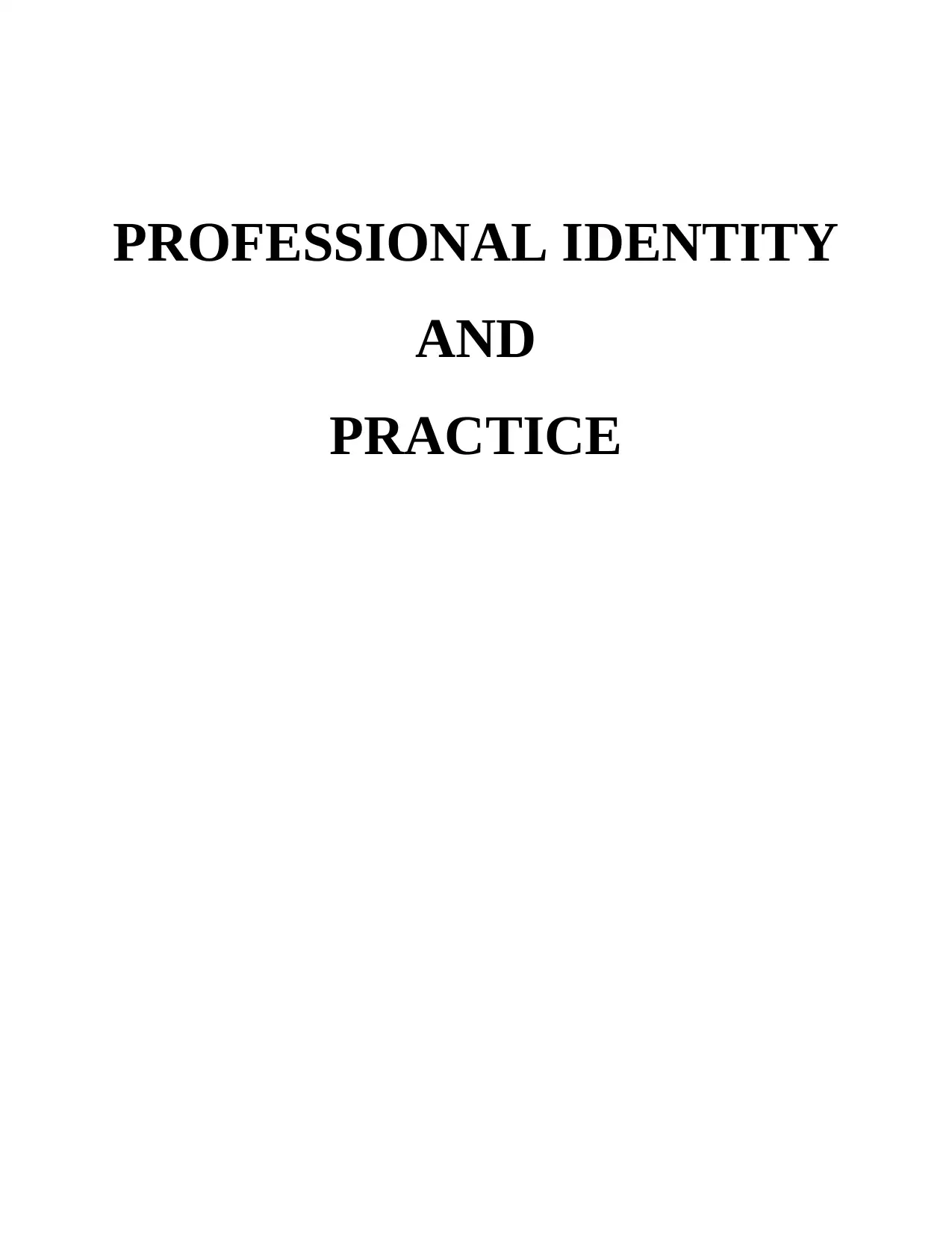
PROFESSIONAL IDENTITY
AND
PRACTICE
AND
PRACTICE
Paraphrase This Document
Need a fresh take? Get an instant paraphrase of this document with our AI Paraphraser
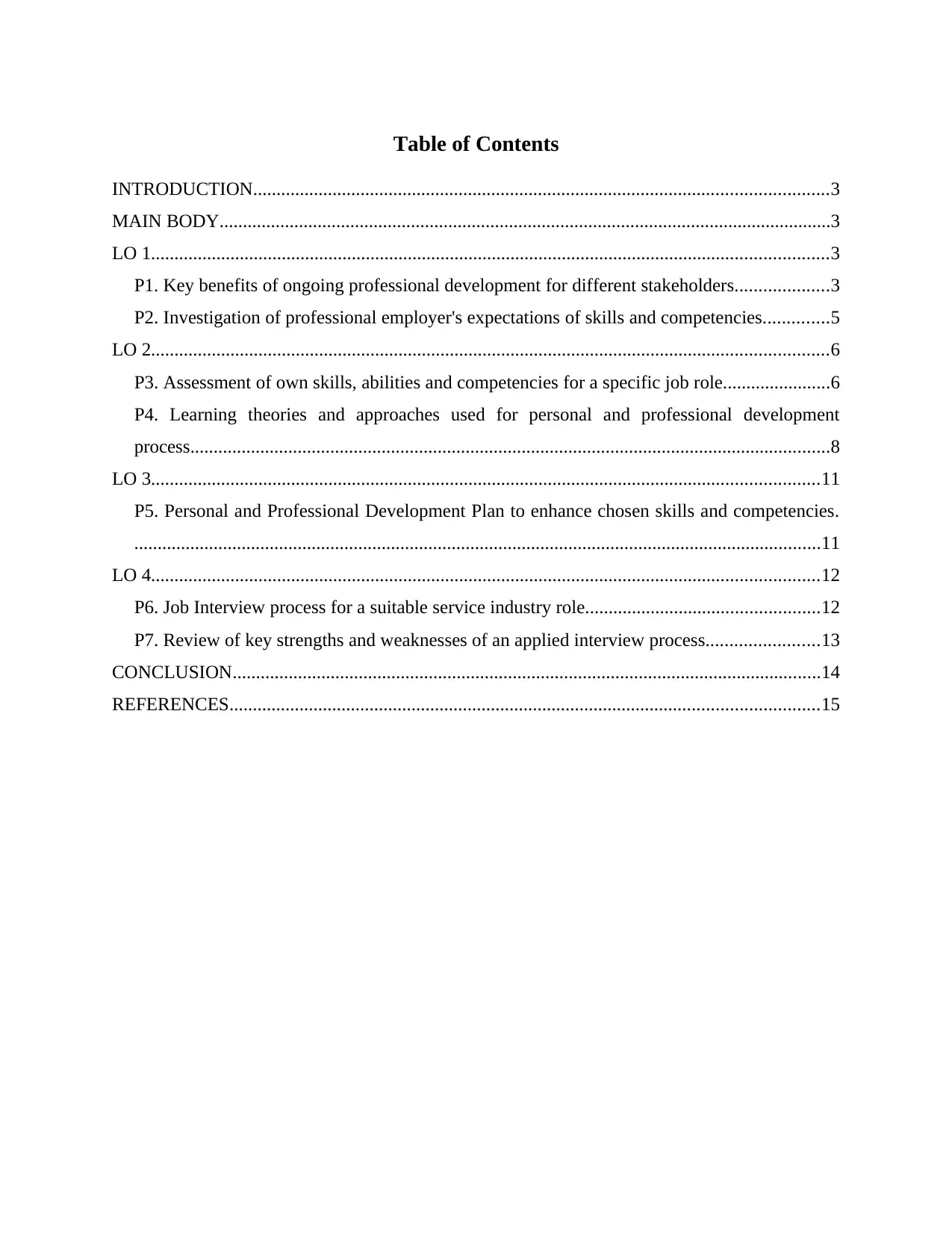
Table of Contents
INTRODUCTION...........................................................................................................................3
MAIN BODY...................................................................................................................................3
LO 1.................................................................................................................................................3
P1. Key benefits of ongoing professional development for different stakeholders....................3
P2. Investigation of professional employer's expectations of skills and competencies..............5
LO 2.................................................................................................................................................6
P3. Assessment of own skills, abilities and competencies for a specific job role.......................6
P4. Learning theories and approaches used for personal and professional development
process.........................................................................................................................................8
LO 3...............................................................................................................................................11
P5. Personal and Professional Development Plan to enhance chosen skills and competencies.
...................................................................................................................................................11
LO 4...............................................................................................................................................12
P6. Job Interview process for a suitable service industry role..................................................12
P7. Review of key strengths and weaknesses of an applied interview process........................13
CONCLUSION..............................................................................................................................14
REFERENCES..............................................................................................................................15
INTRODUCTION...........................................................................................................................3
MAIN BODY...................................................................................................................................3
LO 1.................................................................................................................................................3
P1. Key benefits of ongoing professional development for different stakeholders....................3
P2. Investigation of professional employer's expectations of skills and competencies..............5
LO 2.................................................................................................................................................6
P3. Assessment of own skills, abilities and competencies for a specific job role.......................6
P4. Learning theories and approaches used for personal and professional development
process.........................................................................................................................................8
LO 3...............................................................................................................................................11
P5. Personal and Professional Development Plan to enhance chosen skills and competencies.
...................................................................................................................................................11
LO 4...............................................................................................................................................12
P6. Job Interview process for a suitable service industry role..................................................12
P7. Review of key strengths and weaknesses of an applied interview process........................13
CONCLUSION..............................................................................................................................14
REFERENCES..............................................................................................................................15
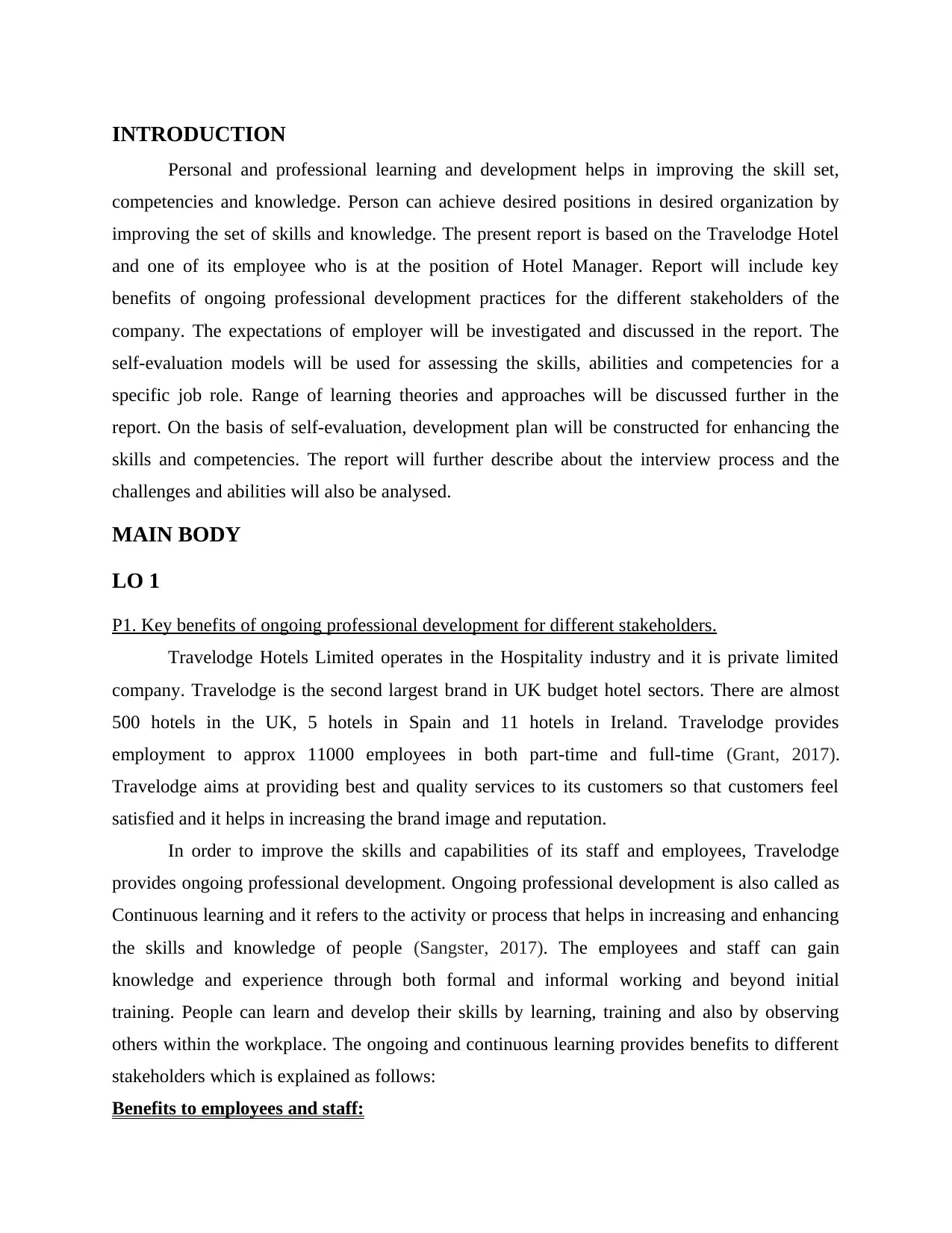
INTRODUCTION
Personal and professional learning and development helps in improving the skill set,
competencies and knowledge. Person can achieve desired positions in desired organization by
improving the set of skills and knowledge. The present report is based on the Travelodge Hotel
and one of its employee who is at the position of Hotel Manager. Report will include key
benefits of ongoing professional development practices for the different stakeholders of the
company. The expectations of employer will be investigated and discussed in the report. The
self-evaluation models will be used for assessing the skills, abilities and competencies for a
specific job role. Range of learning theories and approaches will be discussed further in the
report. On the basis of self-evaluation, development plan will be constructed for enhancing the
skills and competencies. The report will further describe about the interview process and the
challenges and abilities will also be analysed.
MAIN BODY
LO 1
P1. Key benefits of ongoing professional development for different stakeholders.
Travelodge Hotels Limited operates in the Hospitality industry and it is private limited
company. Travelodge is the second largest brand in UK budget hotel sectors. There are almost
500 hotels in the UK, 5 hotels in Spain and 11 hotels in Ireland. Travelodge provides
employment to approx 11000 employees in both part-time and full-time (Grant, 2017).
Travelodge aims at providing best and quality services to its customers so that customers feel
satisfied and it helps in increasing the brand image and reputation.
In order to improve the skills and capabilities of its staff and employees, Travelodge
provides ongoing professional development. Ongoing professional development is also called as
Continuous learning and it refers to the activity or process that helps in increasing and enhancing
the skills and knowledge of people (Sangster, 2017). The employees and staff can gain
knowledge and experience through both formal and informal working and beyond initial
training. People can learn and develop their skills by learning, training and also by observing
others within the workplace. The ongoing and continuous learning provides benefits to different
stakeholders which is explained as follows:
Benefits to employees and staff:
Personal and professional learning and development helps in improving the skill set,
competencies and knowledge. Person can achieve desired positions in desired organization by
improving the set of skills and knowledge. The present report is based on the Travelodge Hotel
and one of its employee who is at the position of Hotel Manager. Report will include key
benefits of ongoing professional development practices for the different stakeholders of the
company. The expectations of employer will be investigated and discussed in the report. The
self-evaluation models will be used for assessing the skills, abilities and competencies for a
specific job role. Range of learning theories and approaches will be discussed further in the
report. On the basis of self-evaluation, development plan will be constructed for enhancing the
skills and competencies. The report will further describe about the interview process and the
challenges and abilities will also be analysed.
MAIN BODY
LO 1
P1. Key benefits of ongoing professional development for different stakeholders.
Travelodge Hotels Limited operates in the Hospitality industry and it is private limited
company. Travelodge is the second largest brand in UK budget hotel sectors. There are almost
500 hotels in the UK, 5 hotels in Spain and 11 hotels in Ireland. Travelodge provides
employment to approx 11000 employees in both part-time and full-time (Grant, 2017).
Travelodge aims at providing best and quality services to its customers so that customers feel
satisfied and it helps in increasing the brand image and reputation.
In order to improve the skills and capabilities of its staff and employees, Travelodge
provides ongoing professional development. Ongoing professional development is also called as
Continuous learning and it refers to the activity or process that helps in increasing and enhancing
the skills and knowledge of people (Sangster, 2017). The employees and staff can gain
knowledge and experience through both formal and informal working and beyond initial
training. People can learn and develop their skills by learning, training and also by observing
others within the workplace. The ongoing and continuous learning provides benefits to different
stakeholders which is explained as follows:
Benefits to employees and staff:
⊘ This is a preview!⊘
Do you want full access?
Subscribe today to unlock all pages.

Trusted by 1+ million students worldwide
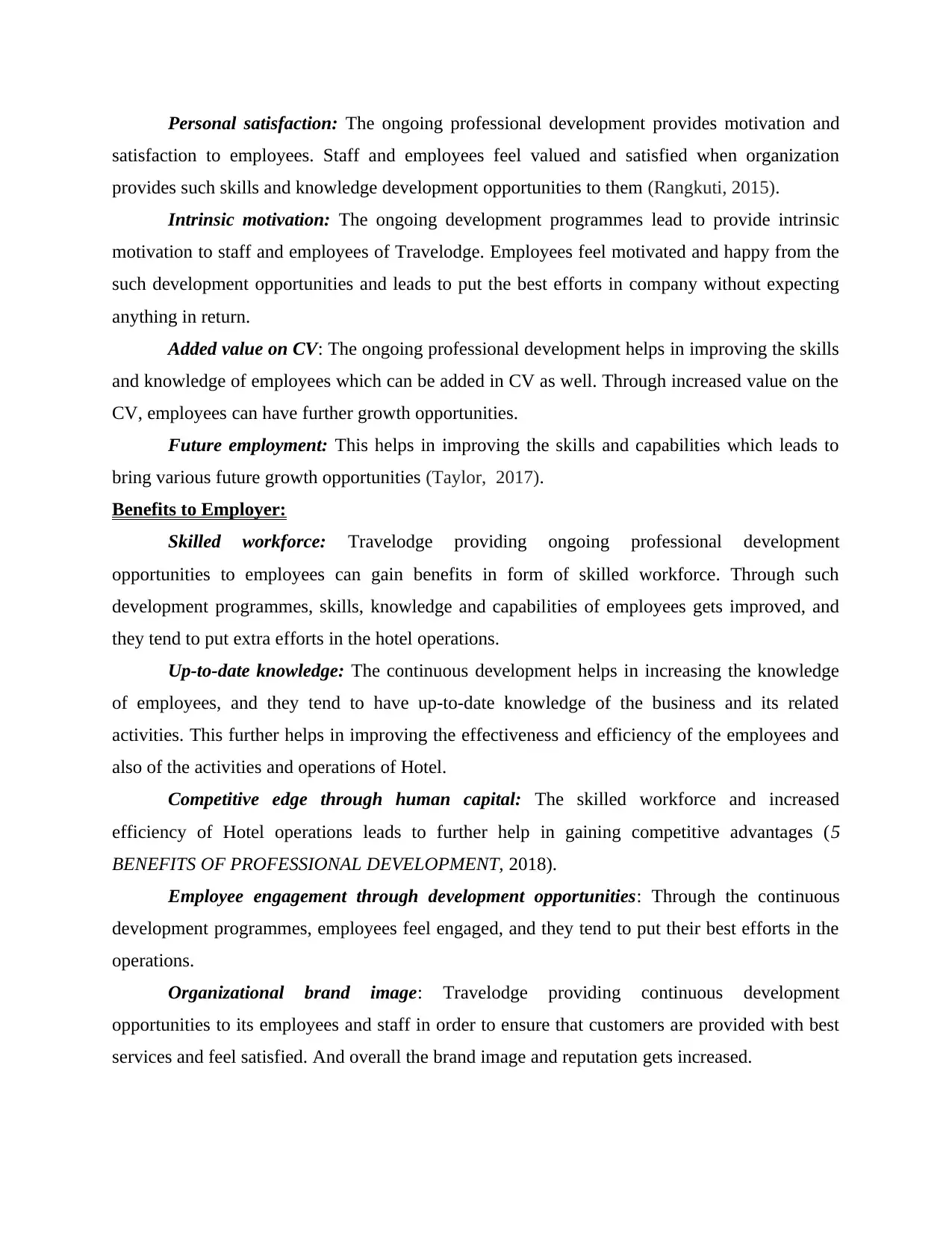
Personal satisfaction: The ongoing professional development provides motivation and
satisfaction to employees. Staff and employees feel valued and satisfied when organization
provides such skills and knowledge development opportunities to them (Rangkuti, 2015).
Intrinsic motivation: The ongoing development programmes lead to provide intrinsic
motivation to staff and employees of Travelodge. Employees feel motivated and happy from the
such development opportunities and leads to put the best efforts in company without expecting
anything in return.
Added value on CV: The ongoing professional development helps in improving the skills
and knowledge of employees which can be added in CV as well. Through increased value on the
CV, employees can have further growth opportunities.
Future employment: This helps in improving the skills and capabilities which leads to
bring various future growth opportunities (Taylor, 2017).
Benefits to Employer:
Skilled workforce: Travelodge providing ongoing professional development
opportunities to employees can gain benefits in form of skilled workforce. Through such
development programmes, skills, knowledge and capabilities of employees gets improved, and
they tend to put extra efforts in the hotel operations.
Up-to-date knowledge: The continuous development helps in increasing the knowledge
of employees, and they tend to have up-to-date knowledge of the business and its related
activities. This further helps in improving the effectiveness and efficiency of the employees and
also of the activities and operations of Hotel.
Competitive edge through human capital: The skilled workforce and increased
efficiency of Hotel operations leads to further help in gaining competitive advantages (5
BENEFITS OF PROFESSIONAL DEVELOPMENT, 2018).
Employee engagement through development opportunities: Through the continuous
development programmes, employees feel engaged, and they tend to put their best efforts in the
operations.
Organizational brand image: Travelodge providing continuous development
opportunities to its employees and staff in order to ensure that customers are provided with best
services and feel satisfied. And overall the brand image and reputation gets increased.
satisfaction to employees. Staff and employees feel valued and satisfied when organization
provides such skills and knowledge development opportunities to them (Rangkuti, 2015).
Intrinsic motivation: The ongoing development programmes lead to provide intrinsic
motivation to staff and employees of Travelodge. Employees feel motivated and happy from the
such development opportunities and leads to put the best efforts in company without expecting
anything in return.
Added value on CV: The ongoing professional development helps in improving the skills
and knowledge of employees which can be added in CV as well. Through increased value on the
CV, employees can have further growth opportunities.
Future employment: This helps in improving the skills and capabilities which leads to
bring various future growth opportunities (Taylor, 2017).
Benefits to Employer:
Skilled workforce: Travelodge providing ongoing professional development
opportunities to employees can gain benefits in form of skilled workforce. Through such
development programmes, skills, knowledge and capabilities of employees gets improved, and
they tend to put extra efforts in the hotel operations.
Up-to-date knowledge: The continuous development helps in increasing the knowledge
of employees, and they tend to have up-to-date knowledge of the business and its related
activities. This further helps in improving the effectiveness and efficiency of the employees and
also of the activities and operations of Hotel.
Competitive edge through human capital: The skilled workforce and increased
efficiency of Hotel operations leads to further help in gaining competitive advantages (5
BENEFITS OF PROFESSIONAL DEVELOPMENT, 2018).
Employee engagement through development opportunities: Through the continuous
development programmes, employees feel engaged, and they tend to put their best efforts in the
operations.
Organizational brand image: Travelodge providing continuous development
opportunities to its employees and staff in order to ensure that customers are provided with best
services and feel satisfied. And overall the brand image and reputation gets increased.
Paraphrase This Document
Need a fresh take? Get an instant paraphrase of this document with our AI Paraphraser
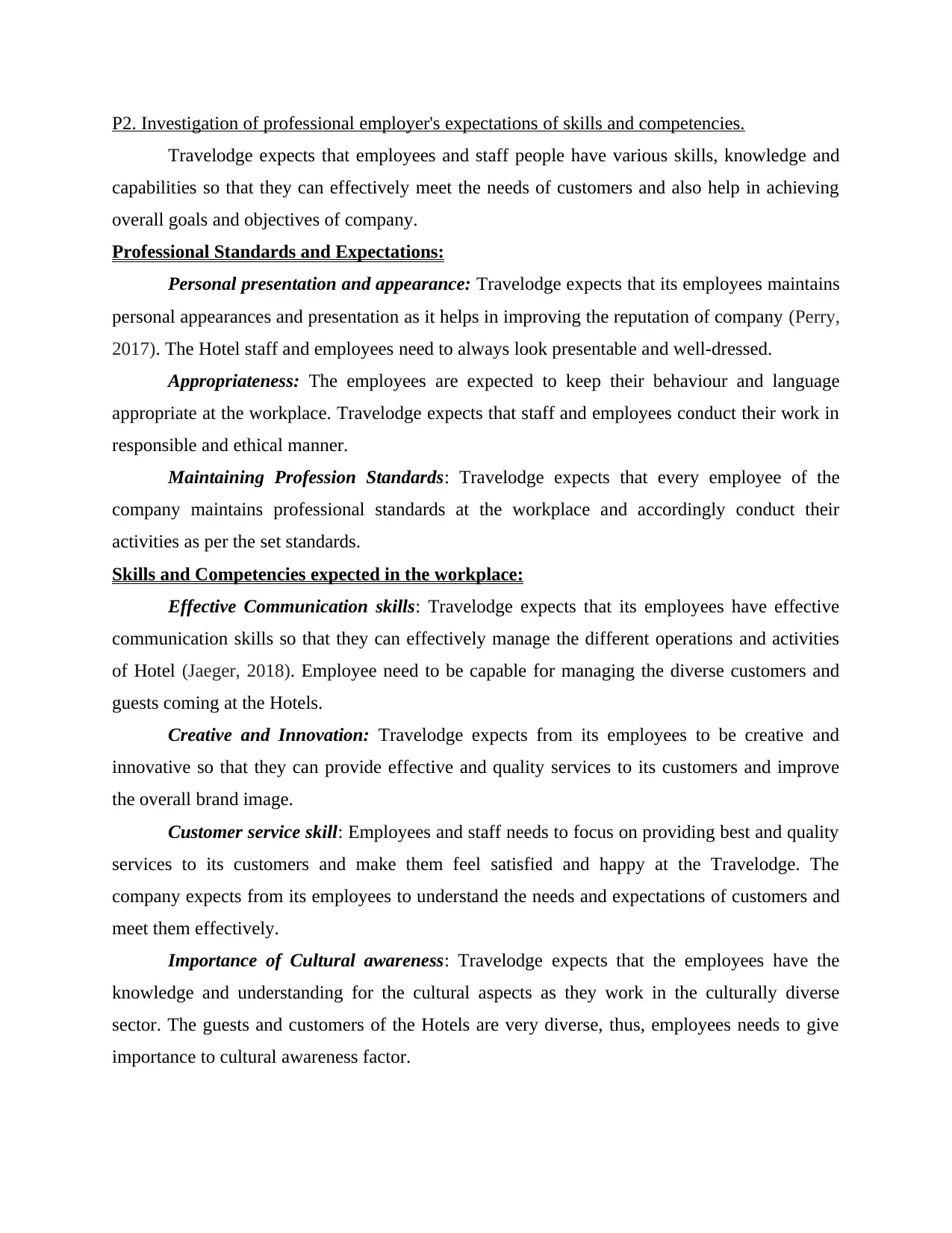
P2. Investigation of professional employer's expectations of skills and competencies.
Travelodge expects that employees and staff people have various skills, knowledge and
capabilities so that they can effectively meet the needs of customers and also help in achieving
overall goals and objectives of company.
Professional Standards and Expectations:
Personal presentation and appearance: Travelodge expects that its employees maintains
personal appearances and presentation as it helps in improving the reputation of company (Perry,
2017). The Hotel staff and employees need to always look presentable and well-dressed.
Appropriateness: The employees are expected to keep their behaviour and language
appropriate at the workplace. Travelodge expects that staff and employees conduct their work in
responsible and ethical manner.
Maintaining Profession Standards: Travelodge expects that every employee of the
company maintains professional standards at the workplace and accordingly conduct their
activities as per the set standards.
Skills and Competencies expected in the workplace:
Effective Communication skills: Travelodge expects that its employees have effective
communication skills so that they can effectively manage the different operations and activities
of Hotel (Jaeger, 2018). Employee need to be capable for managing the diverse customers and
guests coming at the Hotels.
Creative and Innovation: Travelodge expects from its employees to be creative and
innovative so that they can provide effective and quality services to its customers and improve
the overall brand image.
Customer service skill: Employees and staff needs to focus on providing best and quality
services to its customers and make them feel satisfied and happy at the Travelodge. The
company expects from its employees to understand the needs and expectations of customers and
meet them effectively.
Importance of Cultural awareness: Travelodge expects that the employees have the
knowledge and understanding for the cultural aspects as they work in the culturally diverse
sector. The guests and customers of the Hotels are very diverse, thus, employees needs to give
importance to cultural awareness factor.
Travelodge expects that employees and staff people have various skills, knowledge and
capabilities so that they can effectively meet the needs of customers and also help in achieving
overall goals and objectives of company.
Professional Standards and Expectations:
Personal presentation and appearance: Travelodge expects that its employees maintains
personal appearances and presentation as it helps in improving the reputation of company (Perry,
2017). The Hotel staff and employees need to always look presentable and well-dressed.
Appropriateness: The employees are expected to keep their behaviour and language
appropriate at the workplace. Travelodge expects that staff and employees conduct their work in
responsible and ethical manner.
Maintaining Profession Standards: Travelodge expects that every employee of the
company maintains professional standards at the workplace and accordingly conduct their
activities as per the set standards.
Skills and Competencies expected in the workplace:
Effective Communication skills: Travelodge expects that its employees have effective
communication skills so that they can effectively manage the different operations and activities
of Hotel (Jaeger, 2018). Employee need to be capable for managing the diverse customers and
guests coming at the Hotels.
Creative and Innovation: Travelodge expects from its employees to be creative and
innovative so that they can provide effective and quality services to its customers and improve
the overall brand image.
Customer service skill: Employees and staff needs to focus on providing best and quality
services to its customers and make them feel satisfied and happy at the Travelodge. The
company expects from its employees to understand the needs and expectations of customers and
meet them effectively.
Importance of Cultural awareness: Travelodge expects that the employees have the
knowledge and understanding for the cultural aspects as they work in the culturally diverse
sector. The guests and customers of the Hotels are very diverse, thus, employees needs to give
importance to cultural awareness factor.
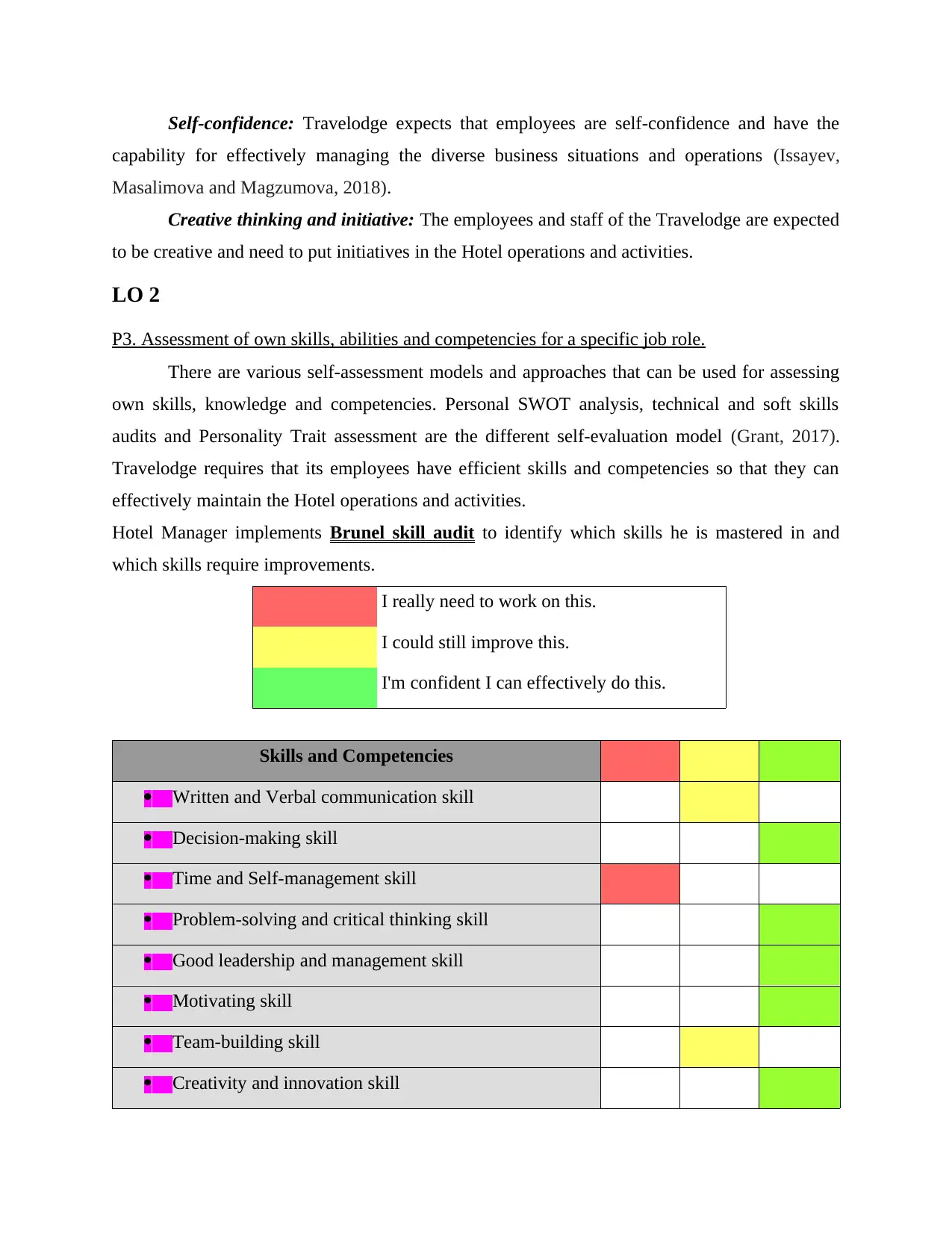
Self-confidence: Travelodge expects that employees are self-confidence and have the
capability for effectively managing the diverse business situations and operations (Issayev,
Masalimova and Magzumova, 2018).
Creative thinking and initiative: The employees and staff of the Travelodge are expected
to be creative and need to put initiatives in the Hotel operations and activities.
LO 2
P3. Assessment of own skills, abilities and competencies for a specific job role.
There are various self-assessment models and approaches that can be used for assessing
own skills, knowledge and competencies. Personal SWOT analysis, technical and soft skills
audits and Personality Trait assessment are the different self-evaluation model (Grant, 2017).
Travelodge requires that its employees have efficient skills and competencies so that they can
effectively maintain the Hotel operations and activities.
Hotel Manager implements Brunel skill audit to identify which skills he is mastered in and
which skills require improvements.
I really need to work on this.
I could still improve this.
I'm confident I can effectively do this.
Skills and Competencies
Written and Verbal communication skill
Decision-making skill
Time and Self-management skill
Problem-solving and critical thinking skill
Good leadership and management skill
Motivating skill
Team-building skill
Creativity and innovation skill
capability for effectively managing the diverse business situations and operations (Issayev,
Masalimova and Magzumova, 2018).
Creative thinking and initiative: The employees and staff of the Travelodge are expected
to be creative and need to put initiatives in the Hotel operations and activities.
LO 2
P3. Assessment of own skills, abilities and competencies for a specific job role.
There are various self-assessment models and approaches that can be used for assessing
own skills, knowledge and competencies. Personal SWOT analysis, technical and soft skills
audits and Personality Trait assessment are the different self-evaluation model (Grant, 2017).
Travelodge requires that its employees have efficient skills and competencies so that they can
effectively maintain the Hotel operations and activities.
Hotel Manager implements Brunel skill audit to identify which skills he is mastered in and
which skills require improvements.
I really need to work on this.
I could still improve this.
I'm confident I can effectively do this.
Skills and Competencies
Written and Verbal communication skill
Decision-making skill
Time and Self-management skill
Problem-solving and critical thinking skill
Good leadership and management skill
Motivating skill
Team-building skill
Creativity and innovation skill
⊘ This is a preview!⊘
Do you want full access?
Subscribe today to unlock all pages.

Trusted by 1+ million students worldwide
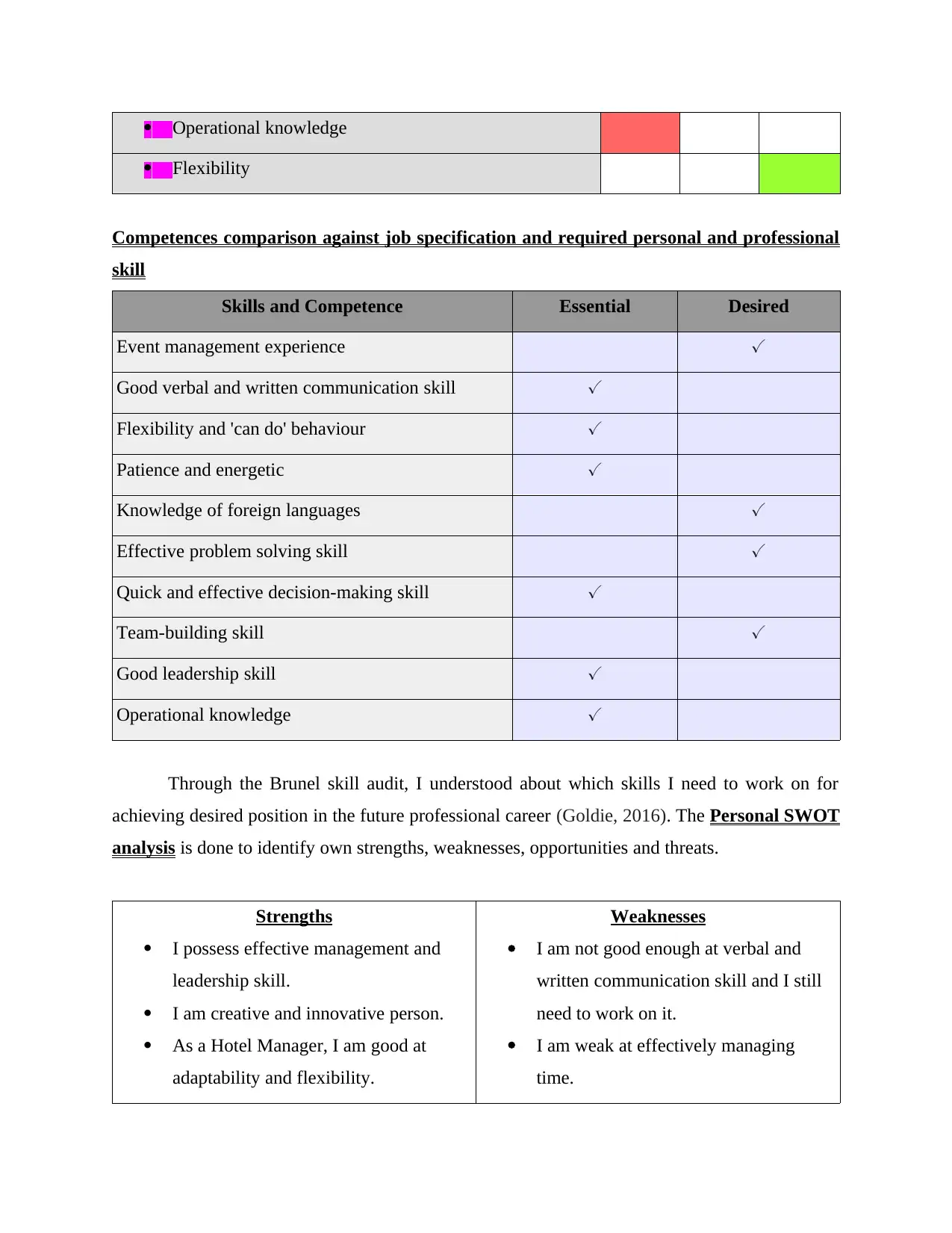
Operational knowledge
Flexibility
Competences comparison against job specification and required personal and professional
skill
Skills and Competence Essential Desired
Event management experience ✓
Good verbal and written communication skill ✓
Flexibility and 'can do' behaviour ✓
Patience and energetic ✓
Knowledge of foreign languages ✓
Effective problem solving skill ✓
Quick and effective decision-making skill ✓
Team-building skill ✓
Good leadership skill ✓
Operational knowledge ✓
Through the Brunel skill audit, I understood about which skills I need to work on for
achieving desired position in the future professional career (Goldie, 2016). The Personal SWOT
analysis is done to identify own strengths, weaknesses, opportunities and threats.
Strengths
I possess effective management and
leadership skill.
I am creative and innovative person.
As a Hotel Manager, I am good at
adaptability and flexibility.
Weaknesses
I am not good enough at verbal and
written communication skill and I still
need to work on it.
I am weak at effectively managing
time.
Flexibility
Competences comparison against job specification and required personal and professional
skill
Skills and Competence Essential Desired
Event management experience ✓
Good verbal and written communication skill ✓
Flexibility and 'can do' behaviour ✓
Patience and energetic ✓
Knowledge of foreign languages ✓
Effective problem solving skill ✓
Quick and effective decision-making skill ✓
Team-building skill ✓
Good leadership skill ✓
Operational knowledge ✓
Through the Brunel skill audit, I understood about which skills I need to work on for
achieving desired position in the future professional career (Goldie, 2016). The Personal SWOT
analysis is done to identify own strengths, weaknesses, opportunities and threats.
Strengths
I possess effective management and
leadership skill.
I am creative and innovative person.
As a Hotel Manager, I am good at
adaptability and flexibility.
Weaknesses
I am not good enough at verbal and
written communication skill and I still
need to work on it.
I am weak at effectively managing
time.
Paraphrase This Document
Need a fresh take? Get an instant paraphrase of this document with our AI Paraphraser
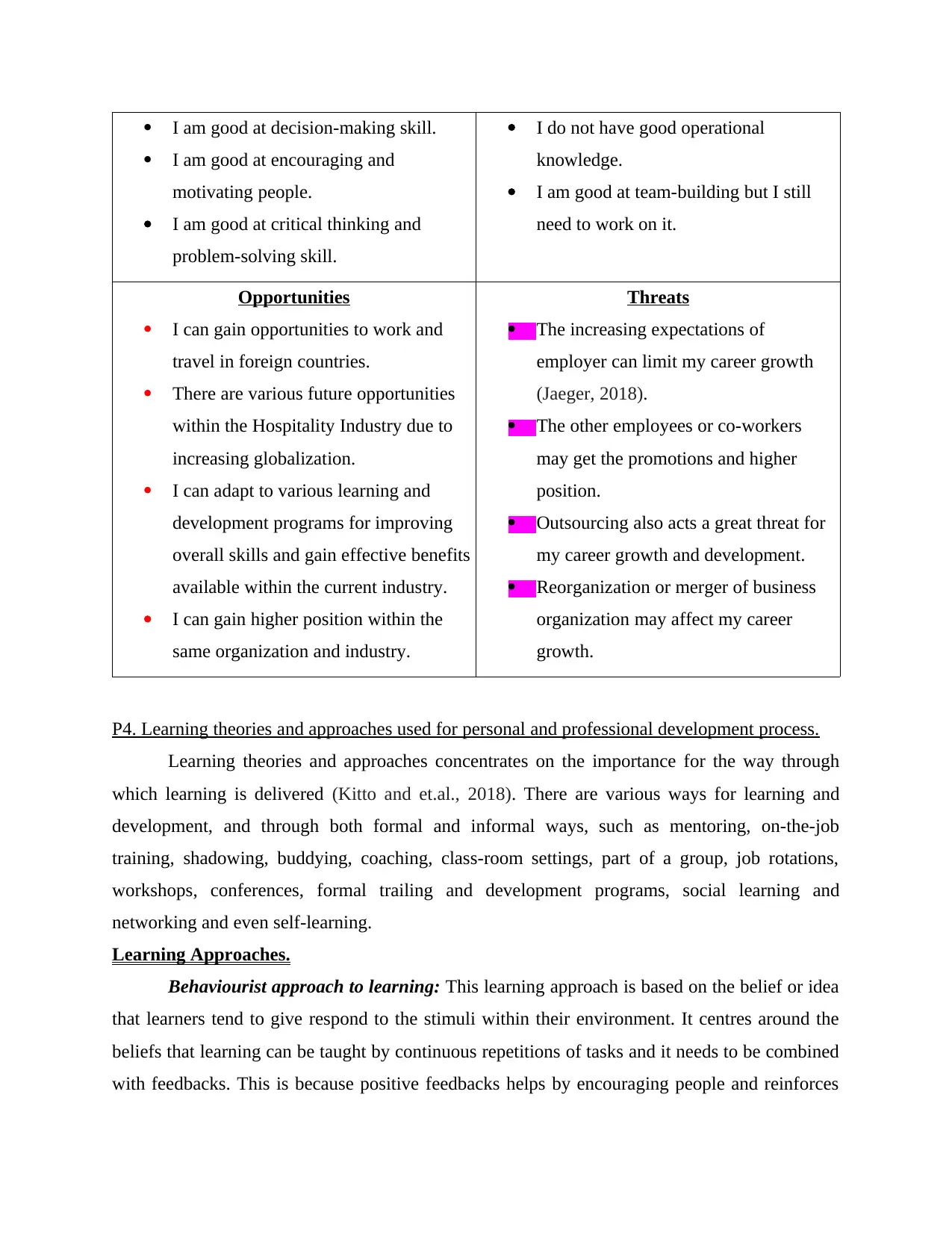
I am good at decision-making skill.
I am good at encouraging and
motivating people.
I am good at critical thinking and
problem-solving skill.
I do not have good operational
knowledge.
I am good at team-building but I still
need to work on it.
Opportunities
I can gain opportunities to work and
travel in foreign countries.
There are various future opportunities
within the Hospitality Industry due to
increasing globalization.
I can adapt to various learning and
development programs for improving
overall skills and gain effective benefits
available within the current industry.
I can gain higher position within the
same organization and industry.
Threats
The increasing expectations of
employer can limit my career growth
(Jaeger, 2018).
The other employees or co-workers
may get the promotions and higher
position.
Outsourcing also acts a great threat for
my career growth and development.
Reorganization or merger of business
organization may affect my career
growth.
P4. Learning theories and approaches used for personal and professional development process.
Learning theories and approaches concentrates on the importance for the way through
which learning is delivered (Kitto and et.al., 2018). There are various ways for learning and
development, and through both formal and informal ways, such as mentoring, on-the-job
training, shadowing, buddying, coaching, class-room settings, part of a group, job rotations,
workshops, conferences, formal trailing and development programs, social learning and
networking and even self-learning.
Learning Approaches.
Behaviourist approach to learning: This learning approach is based on the belief or idea
that learners tend to give respond to the stimuli within their environment. It centres around the
beliefs that learning can be taught by continuous repetitions of tasks and it needs to be combined
with feedbacks. This is because positive feedbacks helps by encouraging people and reinforces
I am good at encouraging and
motivating people.
I am good at critical thinking and
problem-solving skill.
I do not have good operational
knowledge.
I am good at team-building but I still
need to work on it.
Opportunities
I can gain opportunities to work and
travel in foreign countries.
There are various future opportunities
within the Hospitality Industry due to
increasing globalization.
I can adapt to various learning and
development programs for improving
overall skills and gain effective benefits
available within the current industry.
I can gain higher position within the
same organization and industry.
Threats
The increasing expectations of
employer can limit my career growth
(Jaeger, 2018).
The other employees or co-workers
may get the promotions and higher
position.
Outsourcing also acts a great threat for
my career growth and development.
Reorganization or merger of business
organization may affect my career
growth.
P4. Learning theories and approaches used for personal and professional development process.
Learning theories and approaches concentrates on the importance for the way through
which learning is delivered (Kitto and et.al., 2018). There are various ways for learning and
development, and through both formal and informal ways, such as mentoring, on-the-job
training, shadowing, buddying, coaching, class-room settings, part of a group, job rotations,
workshops, conferences, formal trailing and development programs, social learning and
networking and even self-learning.
Learning Approaches.
Behaviourist approach to learning: This learning approach is based on the belief or idea
that learners tend to give respond to the stimuli within their environment. It centres around the
beliefs that learning can be taught by continuous repetitions of tasks and it needs to be combined
with feedbacks. This is because positive feedbacks helps by encouraging people and reinforces
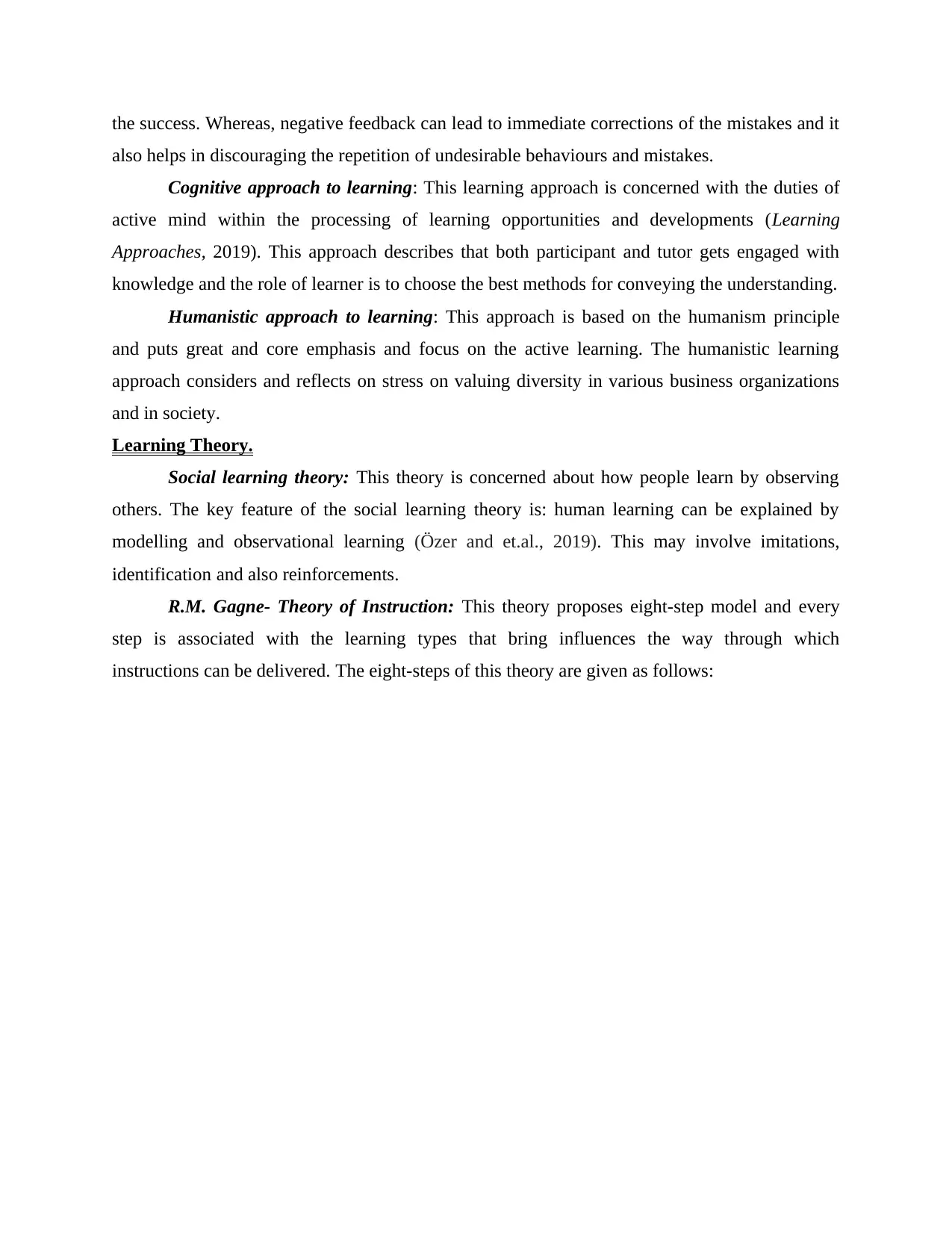
the success. Whereas, negative feedback can lead to immediate corrections of the mistakes and it
also helps in discouraging the repetition of undesirable behaviours and mistakes.
Cognitive approach to learning: This learning approach is concerned with the duties of
active mind within the processing of learning opportunities and developments (Learning
Approaches, 2019). This approach describes that both participant and tutor gets engaged with
knowledge and the role of learner is to choose the best methods for conveying the understanding.
Humanistic approach to learning: This approach is based on the humanism principle
and puts great and core emphasis and focus on the active learning. The humanistic learning
approach considers and reflects on stress on valuing diversity in various business organizations
and in society.
Learning Theory.
Social learning theory: This theory is concerned about how people learn by observing
others. The key feature of the social learning theory is: human learning can be explained by
modelling and observational learning (Özer and et.al., 2019). This may involve imitations,
identification and also reinforcements.
R.M. Gagne- Theory of Instruction: This theory proposes eight-step model and every
step is associated with the learning types that bring influences the way through which
instructions can be delivered. The eight-steps of this theory are given as follows:
also helps in discouraging the repetition of undesirable behaviours and mistakes.
Cognitive approach to learning: This learning approach is concerned with the duties of
active mind within the processing of learning opportunities and developments (Learning
Approaches, 2019). This approach describes that both participant and tutor gets engaged with
knowledge and the role of learner is to choose the best methods for conveying the understanding.
Humanistic approach to learning: This approach is based on the humanism principle
and puts great and core emphasis and focus on the active learning. The humanistic learning
approach considers and reflects on stress on valuing diversity in various business organizations
and in society.
Learning Theory.
Social learning theory: This theory is concerned about how people learn by observing
others. The key feature of the social learning theory is: human learning can be explained by
modelling and observational learning (Özer and et.al., 2019). This may involve imitations,
identification and also reinforcements.
R.M. Gagne- Theory of Instruction: This theory proposes eight-step model and every
step is associated with the learning types that bring influences the way through which
instructions can be delivered. The eight-steps of this theory are given as follows:
⊘ This is a preview!⊘
Do you want full access?
Subscribe today to unlock all pages.

Trusted by 1+ million students worldwide
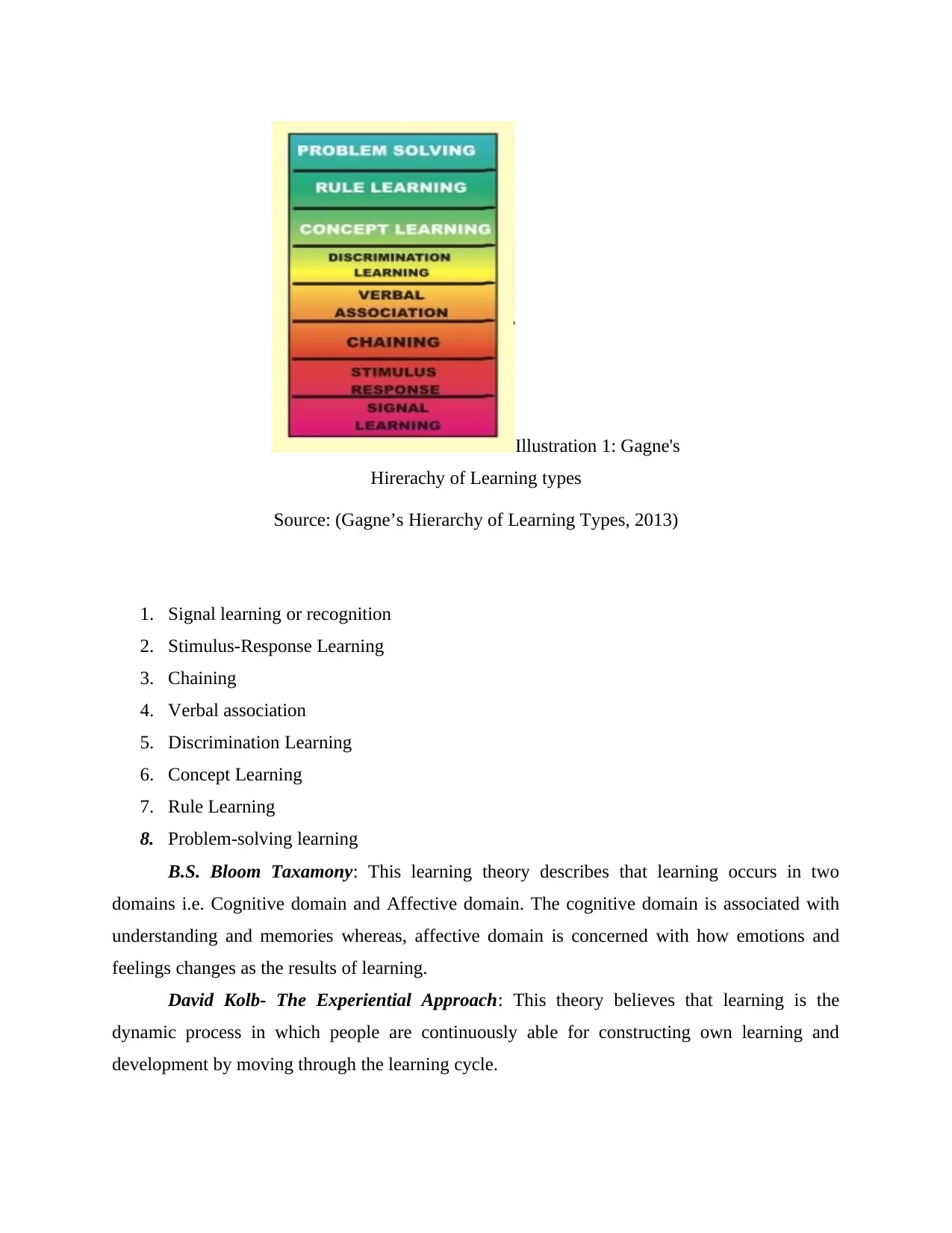
1. Signal learning or recognition
2. Stimulus-Response Learning
3. Chaining
4. Verbal association
5. Discrimination Learning
6. Concept Learning
7. Rule Learning
8. Problem-solving learning
B.S. Bloom Taxamony: This learning theory describes that learning occurs in two
domains i.e. Cognitive domain and Affective domain. The cognitive domain is associated with
understanding and memories whereas, affective domain is concerned with how emotions and
feelings changes as the results of learning.
David Kolb- The Experiential Approach: This theory believes that learning is the
dynamic process in which people are continuously able for constructing own learning and
development by moving through the learning cycle.
Illustration 1: Gagne's
Hirerachy of Learning types
Source: (Gagne’s Hierarchy of Learning Types, 2013)
2. Stimulus-Response Learning
3. Chaining
4. Verbal association
5. Discrimination Learning
6. Concept Learning
7. Rule Learning
8. Problem-solving learning
B.S. Bloom Taxamony: This learning theory describes that learning occurs in two
domains i.e. Cognitive domain and Affective domain. The cognitive domain is associated with
understanding and memories whereas, affective domain is concerned with how emotions and
feelings changes as the results of learning.
David Kolb- The Experiential Approach: This theory believes that learning is the
dynamic process in which people are continuously able for constructing own learning and
development by moving through the learning cycle.
Illustration 1: Gagne's
Hirerachy of Learning types
Source: (Gagne’s Hierarchy of Learning Types, 2013)
Paraphrase This Document
Need a fresh take? Get an instant paraphrase of this document with our AI Paraphraser
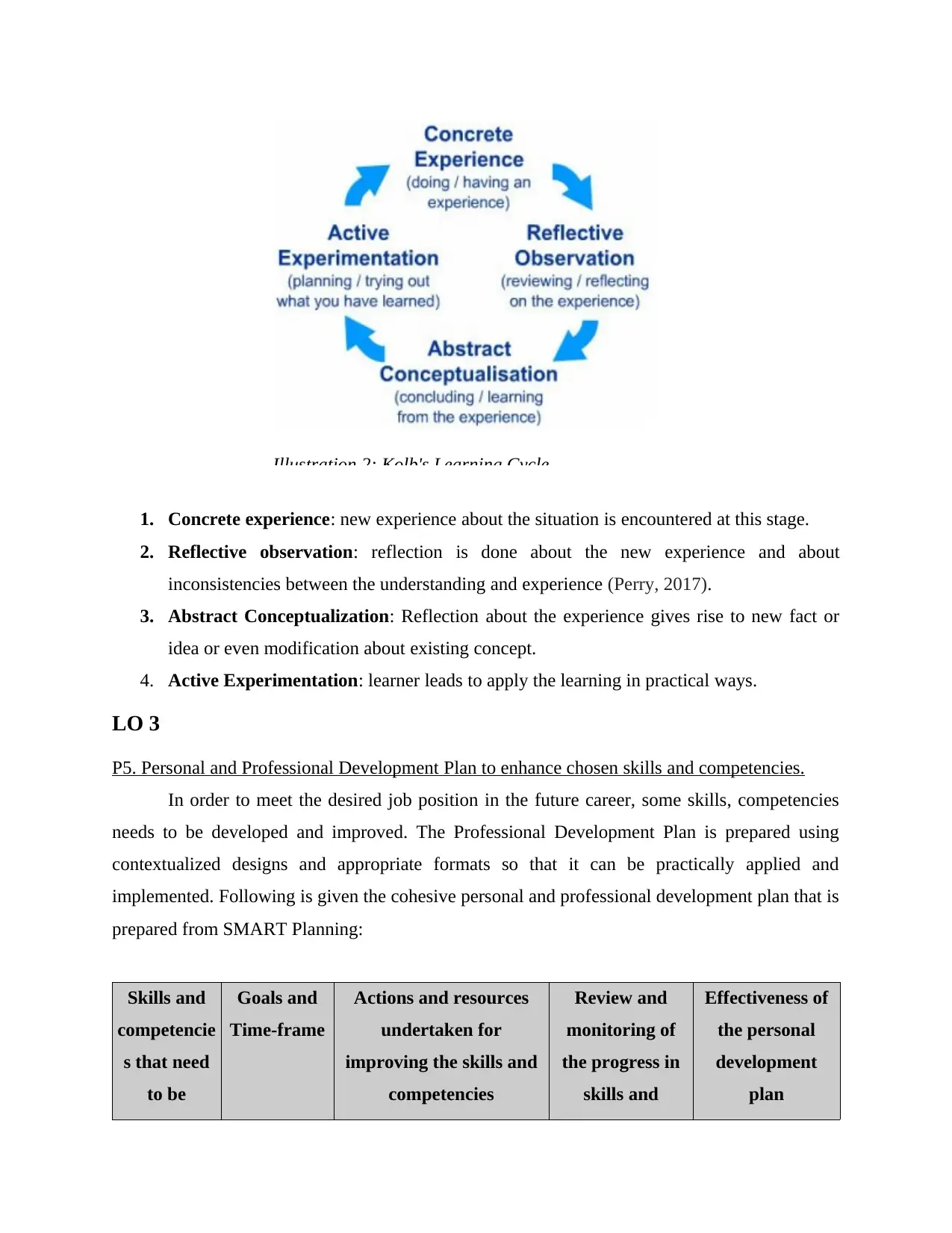
1. Concrete experience: new experience about the situation is encountered at this stage.
2. Reflective observation: reflection is done about the new experience and about
inconsistencies between the understanding and experience (Perry, 2017).
3. Abstract Conceptualization: Reflection about the experience gives rise to new fact or
idea or even modification about existing concept.
4. Active Experimentation: learner leads to apply the learning in practical ways.
LO 3
P5. Personal and Professional Development Plan to enhance chosen skills and competencies.
In order to meet the desired job position in the future career, some skills, competencies
needs to be developed and improved. The Professional Development Plan is prepared using
contextualized designs and appropriate formats so that it can be practically applied and
implemented. Following is given the cohesive personal and professional development plan that is
prepared from SMART Planning:
Skills and
competencie
s that need
to be
Goals and
Time-frame
Actions and resources
undertaken for
improving the skills and
competencies
Review and
monitoring of
the progress in
skills and
Effectiveness of
the personal
development
plan
Illustration 2: Kolb's Learning Cycle
2. Reflective observation: reflection is done about the new experience and about
inconsistencies between the understanding and experience (Perry, 2017).
3. Abstract Conceptualization: Reflection about the experience gives rise to new fact or
idea or even modification about existing concept.
4. Active Experimentation: learner leads to apply the learning in practical ways.
LO 3
P5. Personal and Professional Development Plan to enhance chosen skills and competencies.
In order to meet the desired job position in the future career, some skills, competencies
needs to be developed and improved. The Professional Development Plan is prepared using
contextualized designs and appropriate formats so that it can be practically applied and
implemented. Following is given the cohesive personal and professional development plan that is
prepared from SMART Planning:
Skills and
competencie
s that need
to be
Goals and
Time-frame
Actions and resources
undertaken for
improving the skills and
competencies
Review and
monitoring of
the progress in
skills and
Effectiveness of
the personal
development
plan
Illustration 2: Kolb's Learning Cycle
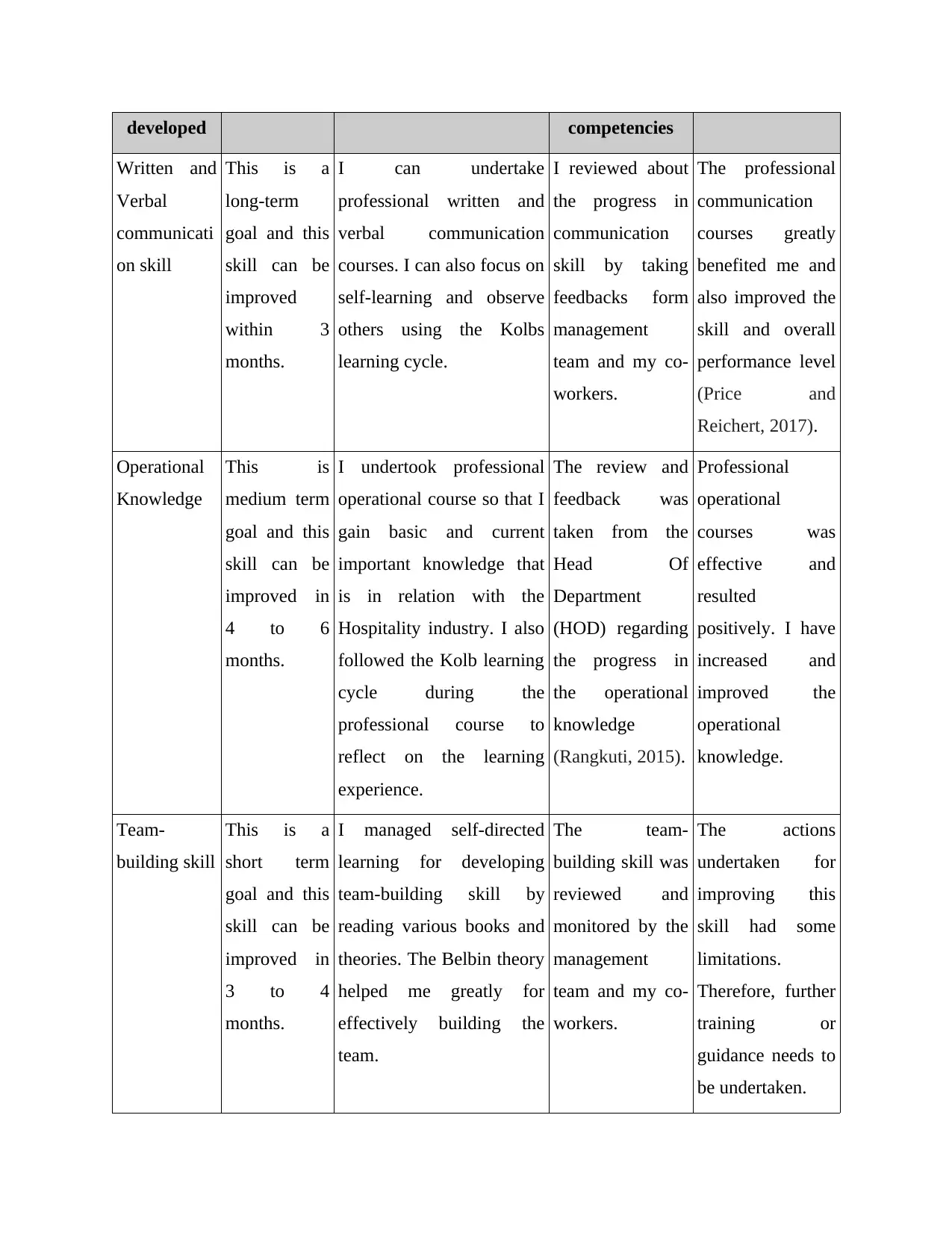
developed competencies
Written and
Verbal
communicati
on skill
This is a
long-term
goal and this
skill can be
improved
within 3
months.
I can undertake
professional written and
verbal communication
courses. I can also focus on
self-learning and observe
others using the Kolbs
learning cycle.
I reviewed about
the progress in
communication
skill by taking
feedbacks form
management
team and my co-
workers.
The professional
communication
courses greatly
benefited me and
also improved the
skill and overall
performance level
(Price and
Reichert, 2017).
Operational
Knowledge
This is
medium term
goal and this
skill can be
improved in
4 to 6
months.
I undertook professional
operational course so that I
gain basic and current
important knowledge that
is in relation with the
Hospitality industry. I also
followed the Kolb learning
cycle during the
professional course to
reflect on the learning
experience.
The review and
feedback was
taken from the
Head Of
Department
(HOD) regarding
the progress in
the operational
knowledge
(Rangkuti, 2015).
Professional
operational
courses was
effective and
resulted
positively. I have
increased and
improved the
operational
knowledge.
Team-
building skill
This is a
short term
goal and this
skill can be
improved in
3 to 4
months.
I managed self-directed
learning for developing
team-building skill by
reading various books and
theories. The Belbin theory
helped me greatly for
effectively building the
team.
The team-
building skill was
reviewed and
monitored by the
management
team and my co-
workers.
The actions
undertaken for
improving this
skill had some
limitations.
Therefore, further
training or
guidance needs to
be undertaken.
Written and
Verbal
communicati
on skill
This is a
long-term
goal and this
skill can be
improved
within 3
months.
I can undertake
professional written and
verbal communication
courses. I can also focus on
self-learning and observe
others using the Kolbs
learning cycle.
I reviewed about
the progress in
communication
skill by taking
feedbacks form
management
team and my co-
workers.
The professional
communication
courses greatly
benefited me and
also improved the
skill and overall
performance level
(Price and
Reichert, 2017).
Operational
Knowledge
This is
medium term
goal and this
skill can be
improved in
4 to 6
months.
I undertook professional
operational course so that I
gain basic and current
important knowledge that
is in relation with the
Hospitality industry. I also
followed the Kolb learning
cycle during the
professional course to
reflect on the learning
experience.
The review and
feedback was
taken from the
Head Of
Department
(HOD) regarding
the progress in
the operational
knowledge
(Rangkuti, 2015).
Professional
operational
courses was
effective and
resulted
positively. I have
increased and
improved the
operational
knowledge.
Team-
building skill
This is a
short term
goal and this
skill can be
improved in
3 to 4
months.
I managed self-directed
learning for developing
team-building skill by
reading various books and
theories. The Belbin theory
helped me greatly for
effectively building the
team.
The team-
building skill was
reviewed and
monitored by the
management
team and my co-
workers.
The actions
undertaken for
improving this
skill had some
limitations.
Therefore, further
training or
guidance needs to
be undertaken.
⊘ This is a preview!⊘
Do you want full access?
Subscribe today to unlock all pages.

Trusted by 1+ million students worldwide
1 out of 16
Related Documents
Your All-in-One AI-Powered Toolkit for Academic Success.
+13062052269
info@desklib.com
Available 24*7 on WhatsApp / Email
![[object Object]](/_next/static/media/star-bottom.7253800d.svg)
Unlock your academic potential
Copyright © 2020–2026 A2Z Services. All Rights Reserved. Developed and managed by ZUCOL.





